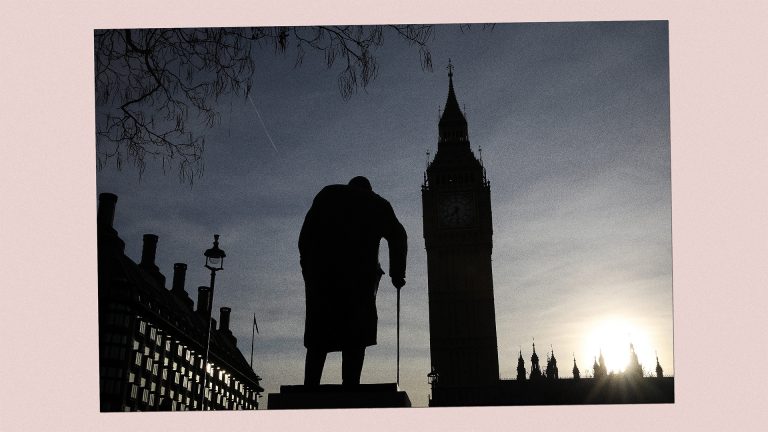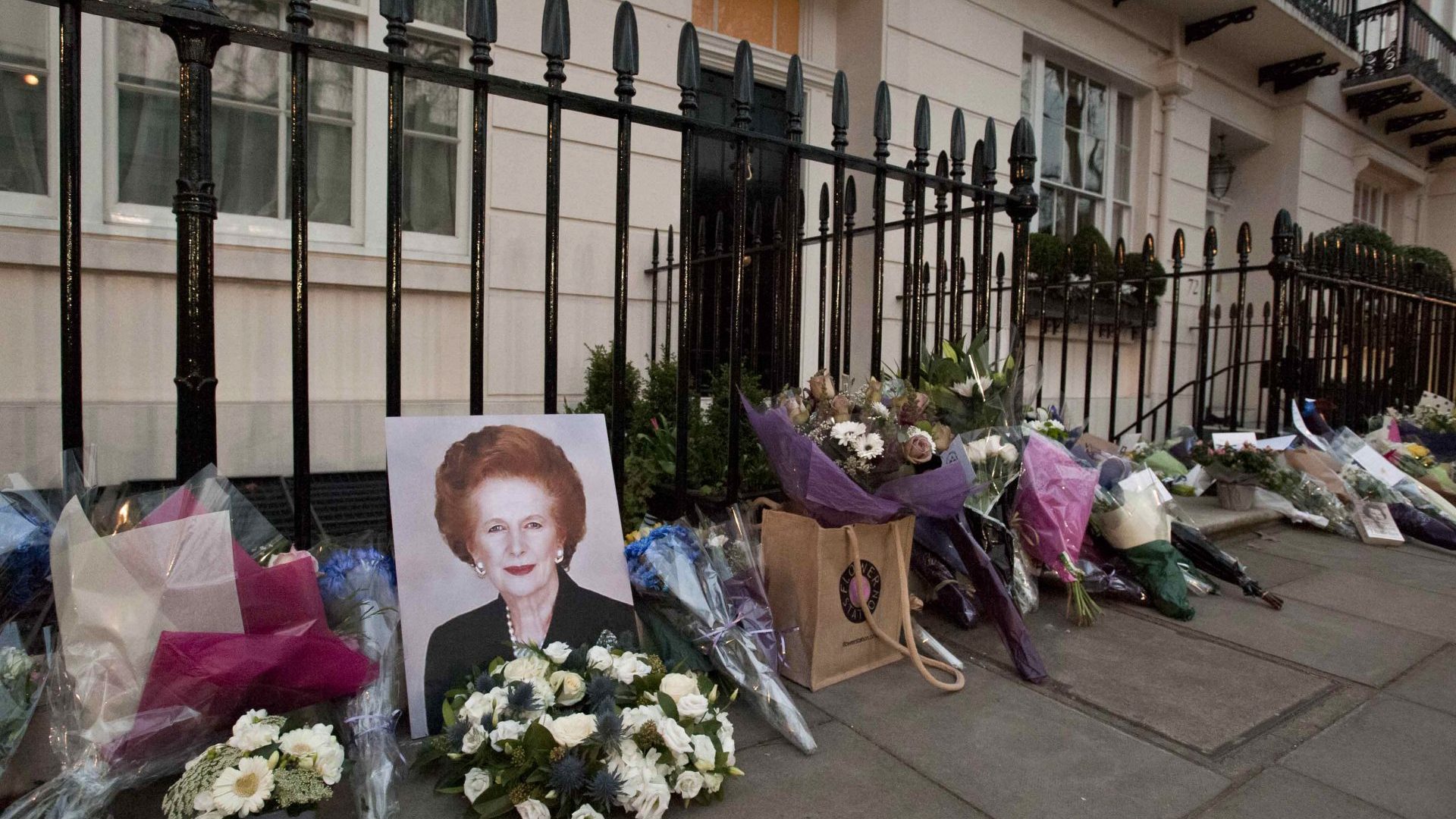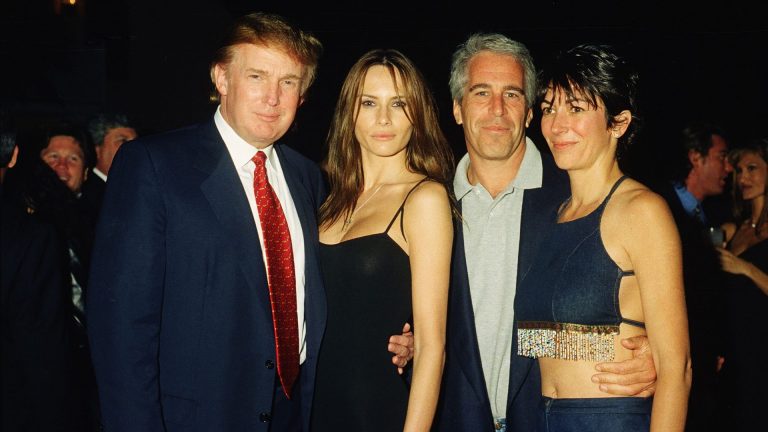It’s Monday, October 13, a day that’s even more frightening than any Friday 13th. For one thing, it’s creeping towards Halloween, but most spine-chilling of all, I’m standing inside Margaret Thatcher’s old bedroom.
Downstairs was once the Roberts Grocery, her family’s modest shop; now it’s a chiropractic clinic. And Thatcher’s boudoir is, unbelievably, rented out by a therapist. Talk about trauma. Is Margaret Thatcher in the room with you right now?
It appears so. I’m in Grantham for the opening day of Thatcher Fest, celebrating the centenary of the first female British prime minister, who haunted No 10 from 1979 to 1990.
Organised by South Kevesten District Council, the festival sees Thatcher resurrected and reimagined in the name of local culture. Posters of her back-combed barnet abound. And today marks what would have been her actual 100th birthday.
Thankfully, it’s not a festival kind of festival – you know, one with dancing and wellies and pingers. There is, after all, something inherently frightening about the idea of a Tory raving in a field (that viral image of David Cameron, smoking a ciggy at Wilderness, is still impossible to unsee). An idea floated back in May when the festival was announced, to have a craft beer called Grantham Lass, doesn’t seem to have materialised.
Instead, the festival is billed by the council as an event “exploring the life, legacy and historical impact of Grantham’s most political figure” with a range of walking tours, talks and ‘80s music. It promises to show both sides of the coin, from supporters (Gyles Brandreth waxing lyrical about Thatcher) to detractors (a punk poetry night featuring tribute act Billy Blagg). “[Her story] needs to be recognised, but I don’t think it necessarily needs to be celebrated,” council leader Ashley Baxter told The BBC.
I should also make an open disclaimer that I am Iron Lady anaemic; I am deficient in any trace of Thatcherism. Second disclaimer; I was born in 1997, years after she resigned in 1990. I even had free milk at school. But then, I did have to endure 14 years of Tory incompetence, so karma really is a cruel mistress.
Regardless, for one day only, I have decided to try to unlearn Thatcher’s destruction of industry, homophobia, callous attitude towards humanity and the rest of it. It was time to see every side of Denis’ menace.
This begins very literally, when I’m faced with the town’s statue of Thatcher just a few minutes on from the station. To get there, I walk through Grantham’s grey residential streets, boarded-up shops and peeling signposts. A group of kids on bikes, competing to see whose globules of spit can travel the further, nearly knock me over.
Almost everyone I speak to, later, reminds me that Grantham was voted the most boring town in Britain (continually, in 1980, 2015 and 2025 to name but a few accolades). Reportedly costing £300,000, the statue stands next to one of Isaac Newton, another Grantham alumnus.
I decide to check out the local library display, part of the festival, since it’s round the corner in the Isaac Newton Centre. I assume this is an august building of some sort; but it’s actually a shopping mall.
The library, which takes me at least 15 minutes to find, is shunted next to a huge Morrison’s Cafe. It takes me another few minutes to find the display: it’s a small glass cabinet at the entrance that, at first, I wandered past. In it, is the kind of droll memorabilia that immediately makes your eyes glaze over.
Deflated, I saunter to Thatcher’s old house on North Parade. The grocery her family famously owned is now Living Health, a natural beauty therapy centre. At the front, there’s a small tribute, with archive imagery of the grocers’ daughter.
I speak to Laura, the manager, at the desk. “We’ve had an awful lot of interest… it’s a privilege to be here, an old property with a little bit of character,” she says, explaining that a few walking tours have recently ambled through to pay their respects.
Earlier today, a woman came in to have a look around: she had travelled from Seattle, Washington. “She needed to have a treatment today. She didn’t care what it was, so long as she could get a treatment on Thatcher’s 100th birthday. So we managed to fit her in for an eyebrow wax.” She even got a bonus tour upstairs. “She was absolutely enthralled by it,” reports Laura.
I chance my luck. I’ve only come from Manchester, but could I peek in for a look, too? Asking a colleague to cover the desk, she kindly takes me up the “rabbit warren” and I ask her what she thinks of Thatcher as we clamber up the creaking stairs. “I think she did quite a good job. Being female, that’s empowering. I didn’t have any qualms about her,” she says, as we enter a tiny bedroom, now the aforementioned counselling room.
It’s a surreal experience. A huddle of empty chairs sit in the center. Stock photographs of tranquil forests line the walls. A box of tissues lies on the table. I wonder if it’s for the Thatcher tours.
A few hours later, I find myself in the Blue Pig pub, having what the landlady calls a “Cruz” (Spanglish beers already have slangy names) and chatting to “George”, who wishes not to be named, about Thatcher Fest. His view is that it is a“waste of fucking money.”
For the most part, no one I’ve chatted to has seemed to be bothered about what’s going on. But “George” speaks passionately about his hatred for Thatcher. And, that ghoulish statue. “Westminster wouldn’t have it, because of all the trouble it would have caused,” he says (local councillors vetoed it being displayed in 2018).
He talks powerfully about Thatcher’s destruction of mining, council housing and public services. “This lady was not for turning for the simple reason that she was never going to listen to anybody else,” he says. He remembers being a teenager in the late ‘70s and his parents having to cut down on spending and his dad going on a three day week to fight for his job.
Most of all, as someone who works for the council, he laments the fact that resources are so stretched, but they somehow quantitative-eased some magic money for Thatcher Fest. The only thing he supported was her foreign policy.
“The only good thing that woman did was stand up and say that’s our island, we’ll fight for it. The Falklands,” he says. “George” doesn’t mind visitors coming to Grantham to learn about Newton. “But then you mention her name and you ruin everyone’s night.” I swiftly depart.
After walking out of town (past, fittingly, the blue-plaque-emblazoned house of Madame Montari, creepy wax doll modeller) I get to my next pit-stop: Kesteven and Grantham Girls’ School, which Thatcher attended from 1936 to 1943. I enter the Old Hall, a blue-carpeted room with antiquated tables, each adorned with newspaper clippings and student print-outs about Thatcher’s time at KGGS.
Ros Turner, a friendly history and politics teacher, tells me that I’ve just missed Kemi Badenoch (ironically, it seems the Badenoch spelling curse has spread: the small pieces of paper on the display table sharing tidbits about Thatcher, all read “Margret” without an ‘a’).
“She sat in a room of 16-year-olds. That was an amazing opportunity for our politics students to be able to engage. They were asking her questions based on her party conference [speech], about ECHR, net zero, stamp duty,” Turner says. Makes PMQs, I imagine, seem like a piece of fruitcake.
And what of Thatcher Fest? “I was really glad to see they were doing a mix of different stuff. When I teach politics, we have to present both sides and let the students make up their own minds,” she says. It points to the endless divisive nature of Thatcher as a political figure, often likened to Marmite (to people like “George” and myself, she’s probably closer to Bovril — the essence of a cow).
But one thing many here agree on is her supposed strength. Turner respects Thatcher’s resilience. “We can’t shy away from the fact she was the first female prime minister. I think whatever way you look at it, coming from a working class background, it’s really cool… you can admire someone’s determination without sharing their direction. I think you’re able to hold both things at once.”
Next, I speak to Elizabeth, who has flown from Hong Kong with her husband, to visit her old school. She, like Thatcher, was head girl at KGGS. “I remember being interviewed for a radio show at the time. They said, “you could be the future prime minister.”
It didn’t transpire, but Elizabeth admires her predecessor. “I think she’s an inspiration. If you’re Tory or Labour, there’s no question she broke boundaries. It’s girl power at its finest. So there’s pride.” And, her humble roots. “To come from a small town as the greengrocer’s daughter, who would have thought? I feel as a Grantham girl, that’s inspiring.”
It seems that “daughter of a greengrocer” cuts through far more than “son of a toolmaker” does these days. It’s why Thatcher still has currency in contemporary British politics; the Conservatives desperately exhumed her image for their recent party conference (including a gauche mosaic and life-sized mannequin) and key Reform voices have pledged allegiance. “A battle for her legacy is under way between the party she once led and the insurgent threat to its survival,” wrote Ben Quinn for The Guardian.
Starmer, never to be outdone when it comes to mimicry, has also praised her over the last few years. If tradition, according to GK Chesterton, enfranchises the dead with votes, Thatcher, at times, is a special advisor. The lady is for returning, again, and again, and again. But do people actually want an endless comeback tour?
As I leave the Old Hall, I walk past a bust of Thatcher. “A patriot of courage, tenacity and dedication,” reads the engraving. It seems everyone here visiting KGGS agrees. But I can’t stay and watch Meryl Streep embody these unnerving traits as The Iron Lady, which is about to be screened downstairs, because I’ve got better things to do: namely, going to see Margaret Thatcher as a Soho cabaret star.
Suggested Reading

Apparently I hate Winston Churchill
“It’s your Thatcher Fest headliner…Margaaaaaaaret Thatcher!” bellows a voiceover as a drag queen dressed as “Maggie” resplendent in a “catalogue” suit and a handbag stuffed with a carton of milk, takes to the stage of Grantham’s Guildhall Theatre. “It’s true. We have become a cabaret superstar,” Thatcher, played expertly by Matthe Tedford in Spitting Image fashion, RPs over YMCA, dancing next to her scantily clad male dancers (“the wets”).
It’s the first time that Margaret Thatcher, Queen of Soho has come to her hometown. A camped-up pseudo-panto, it imagines the titular character getting lost in the London district on the eve of the vote on Section 28.
As someone who was devoid of humour (“there was not a lot of fun or sparkle in my life,” she once wrote), the real Thatcher is an alluring target for ridicule, a caricaturist’s dream muse. And the show is stuffed with sharp gags.
The risk of this kind of political satire, though, is a watering down of the person behind the mask, making the unsavoury palatable. Amid the biting takedowns of Thatcher’s homophobia, bawdy innuendo and flying dildos, it ends with her as a sort of hero, pleading for understanding at the end.
“The show creates a surprisingly sympathetic dilemma for the prime minister,” The Telegraph’s Marianka Swain wrote previously in a glowing review when it was on tour in 2024. In a roundabout way, it makes for relatively good PR for Thatcher.
Which is why Edwina Currie, who I bump into on the way out, wasn’t horrified. “I thought it was hilarious,” the veteran Tory, wearing a sparkly silver hat, tells me as she walks out of the theatre with her team. “Margaret [though] would not have understood most of it. That’s what a straight-laced Methodist upbringing in Grantham does to you, it closes off the apertures of the mind,” she laughs.
Talking about her role in the age of consent campaign in the ‘90s (she says she “made more friends than I ever thought possible”) Currie provides proof that one scene in the show, where Thatcher comes across a colleague in a gay club, is surprisingly accurate.
She tells me about a night during the campaign when “we ended up in the Ministry of Sound. [I saw] a clerk to the House of Lords who helped draft the amendment in gay bondage gear, it was really interesting. I went: ‘Douglas!’ He said, ‘sure, I’m enjoying myself now!#”
It’s difficult to tell how many people are enjoying Thatcher Fest as a whole. While Thatcher: Queen of Soho is full and rapturously received, most of the other events don’t seem to be attracting large audiences. Despite a lot of press, the only ticketed event that’s sold out is Brandreth’s talk celebrating Margaret Thatcher, Elizabeth II and — not sure why — Winnie the Pooh.
And Currie’s own talks aren’t exactly selling like hot cakes. At the time of writing, 94 out of 214 tickets for My Life with Margaret Thatcher were still up for grabs, less than 20 hours until the event (Grantham has a population of 44,580 and, it must be said, not much to do). Thatcher’s death in April 2013, which saw street parties break out across the UK, had far more jubilation than her Fest.
Here lies another divide, I think, as I leave Grantham’s so-called Cultural Quarter. In British politics, Thatcher still looms large, exhumed to galvanise waning support bases. And some of those who lived through her miserable reign are still rightfully bitter.
But, for many average Granthamers, there’s no desire to remember her. She is no more important to the town than, say, a local crazy cat lady or an eccentric geriatric. Marmite, for the median, is alright.
Once again, before I run for the last, privatised, train of the night, I walk past that fated statue. The Iron Lady’s bronze bust, refusing to erode. I notice that a single bouquet of flowers has appeared underneath it, a solo offering from a mystery Thatcherite. I’d bet my ticket home that the secret admirer is from Seattle, not Grantham.
Kyle MacNeill is a freelance writer whose work has appeared in the New York Times, Financial Times and Wall Street Journal









